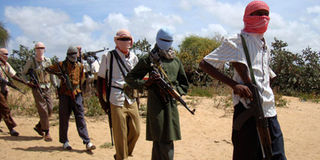Shabaab warns of Nairobi terror attack during Ramadhan

Al-Shabaab militia head to Somalia's southern port of Kismayu October 1, 2009. The terror group has warned of terror attacks in Nairobi over the month of Ramadhan July 20, 2012. FILE
Somalia militia Al-Shabaab has warned of terror attacks in Nairobi over the month of Ramadhan that starts Saturday.
Nairobi police boss Anthony Kibuchi made the revelation Friday, barely a day after he ordered increased police presence around shopping malls and bus stops in the city.
"Al-Shabaab terrorists have issued threats that they will carry out massive destruction during Holy Month of Ramadhan. Let everybody be extra alert,” he said.
On Thursday, the Israeli embassy in Nairobi repeated warnings of a global onslaught by terrorists, saying Kenya was among the countries targeted.
The Al-Shabaab has since October last year hit targets in Kenya, most recently in Wajir, where four people were injured in twin grenade explosions on Wednesday.
One blast went off at around 7.45pm at Dubai Shopping Mall and the second exploded about 400 metres away.
Israeli Prime Minister Benjamin Netanyahu described the attacks as "horrific" and likened them to an earlier explosion at a bus in Bulgaria where seven people, among them six Israelis were killed.
The bus was packed with young Israeli tourists.
In a dispatch from the Nairobi embassy, Mr Netanyahu said: “All signs point towards Iran. Over the last few months we have seen Iran’s attempts to attack Israelis in Thailand, India, Georgia, Kenya, Cyprus and other countries. This is a global Iranian terror onslaught and Israel will react firmly to it.”
Two Iranians — Mr Ahmad Abolafathi Mohammed and Mr Sayed Mansour Mousa — were arrested in Kenya last month and detained at the Kamiti Maximum Security Prison on charges of being in possession of 15 kilogrammes of RDX, a chemical used in making bombs.
RDX is a more powerful explosive compared to TNT, the conventional ingredient for making bombs such as the one used in 1998 US embassy attack in Nairobi which killed more than 200 people.
In Nairobi, Mr Kibuchi said “vulnerable places” had been identified and more officers deployed to keep vigil, including the paramilitary General Service Unit personnel.
On Wednesday, a United Nations report that cited intelligence reports revealed that Al-Shabaab was planning grenade attacks at one of its offices in Nairobi.
“It is possible that the increase in media reporting on UN aid to Amisom forces as well as on security at the Dadaab refugee camps could have contributed to raising the profile and priority of the United Nations as a potential target,” the report says in part.
Al-Shabaab launched terror attacks in Kenya after Kenya Defence Forces entered Somalia in October last year.
At least 19 attacks have occurred since with grenades being used in most of them.
Nairobi has been hit four times, most recently when a fertiliser bomb exploded at Assanand’s House on Moi Avenue, injuring 36 people in May.
America’s Associated Press reported that the two Iranians are believed to be members of Iran’s Islamic Revolutionary Guards Corps Quds Force, an elite and secretive unit that acts against foreign interests.
Last week, the United States embassy announced that the country’s government employees had been prohibited from traveling to North Eastern province, where most of the terror attacks have happened, and also cautioned its citizens from making unnecessary visits.




